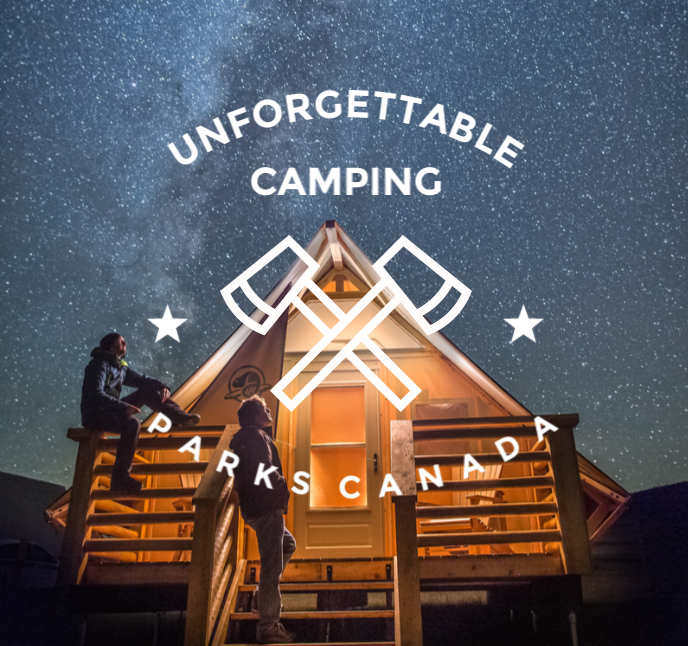Originally published April 10, 2019
Camping in Canada’s National Parks can be an unforgettable experience with memories that last a lifetime.

Taking in the breathtaking Milky Way views at night from an oTENTik in the Dark Sky Preserve, in Grasslands National Park. Photo Parks Canada
To help ensure your family has the best experience possible, it’s essential to plan ahead and be prepared, according to Ed Jager, Parks Canada director of visitor experience.
Because camping is becoming more and more popular, Jager advises making a reservation. The Parks Canada website will identify camping sites that are available in the national park you want to visit. You can reserve online using the Parks Canada Reservation Service or by phone at l 1-877-RESERVE (1-877-737-3783)
On busy long weekends, when the majority of people go out, camping spots tend to fill up very quickly. You’ll have a good chance of getting a site on other weekends, or if you can travel during the week, you’ll have an even better likelihood of getting the spot you prefer.
Get the App, Learn to Camp
The Parks Canada Learn to Camp app is chock full of information on the national parks, camping basics, packing checklists, and even recipes and cooking advice.
“Make sure you have good equipment,” Jager says. Make a list, and if you’re new to camping, it’s a good idea to test out your equipment before you use it at the campground. For example, if you just bought a new tent, set your tent up in the living room or backyard before you head out. As Jager puts it: “You don’t want to end up in the dark in the rain trying to put your tent up.” Make sure you know how your stove works and when packing food, think about each meal individually, so you bring the right amount of food.
To Tent or Not to Tent
There are lots of camping options in addition to tenting. If you’re new to camping and don’t necessarily want to get all the equipment right away,, Parks Canada offers a variety of accommodation options, including Equipped campsites (everything is there for you including tent, sleeping mats and stoves) Yurts, OTENTiks (a cross between a tent and a rustic cabin) or an Oasis. Only a few select locations offer an Oasis, accommodation shaped like a very large water droplet with a bed and a hammock loft, suitable for couples or small families (two children under age 12).

New Canadians from Moncton, Halifax and Charlottetown participated in the Parks Canada Learn to Camp program. Photo Parks Canada
Young Explorers
Most Parks Canada sites offer the Xplorers program. After you arrive at a national park or historic site, ask the Parks Canada staff for the Xplorers booklet, which typically lists 10 – 20 activities for families to do together. “It’s designed to help you have the most amazing experience possible of that place,” Jager says, noting that the activities you’ll do will vary depending on the location you’re at. When you’ve completed the activities, you can take the booklet back to parks staff, and the kids will get a souvenir.
If you’re planning to visit a lot of national parks and historic sites this year, Jager suggests ordering the Parks Canada Discovery Pass online, as it allows unlimited visits throughout the year and it makes it more convenient to visit. There’s a cost savings once you’ve visited more than seven times, Jager says. An added bonus is that you’ll receive a discount on online purchases of official Parks Canada merchandise.
Even if you’ve visited a national park or historic site already, “every one of those places renews its programming every year,” Jager says. So if your family has a favourite place, you can return again and again and always discover something new.
Mountain parks, historic fortresses, locations related to the fur trade, and Indigenous history – there’s a wide range of places to visit. “In many cases, a number of those stories are all woven together in one spot,” Jager notes. “The whole idea behind the national park system and historic sites is that they represent the best of Canada, with a representation of all the different geographic regions and all the amazing stories that our country has. I encourage people to visit all of our locations and also think about the places that are near them that maybe they haven’t discovered yet. People the value of nature. Our lives are becoming more and more urban. More and more, we need to take those opportunities to connect with nature.”

Two campers relax at their scenic waterfront campsite at Arbutus Point in Gulf Islands National Park Reserve. Photo Parks Canada
Learn to Camp
If you and your family are new to camping, keep an eye out in early April for the registration launch for this year’s Parks Canada Learn to Camp weekends. Learn to Camp weekends take place starting in May throughout the summer, with weekend events held at national parks and historic sites across Canada. Participants will learn about all aspects of camping, from how to set up a tent, to how to start a fire, how to cook over a campfire, and much more. The cost is $44 per person and includes camping fees, food and camping equipment all included. “It’s an amazing experience that sets people up to head out and have a positive first experience,” Jager says.
For details on camping in Canada’s National Parks, visit: Parks Canada





